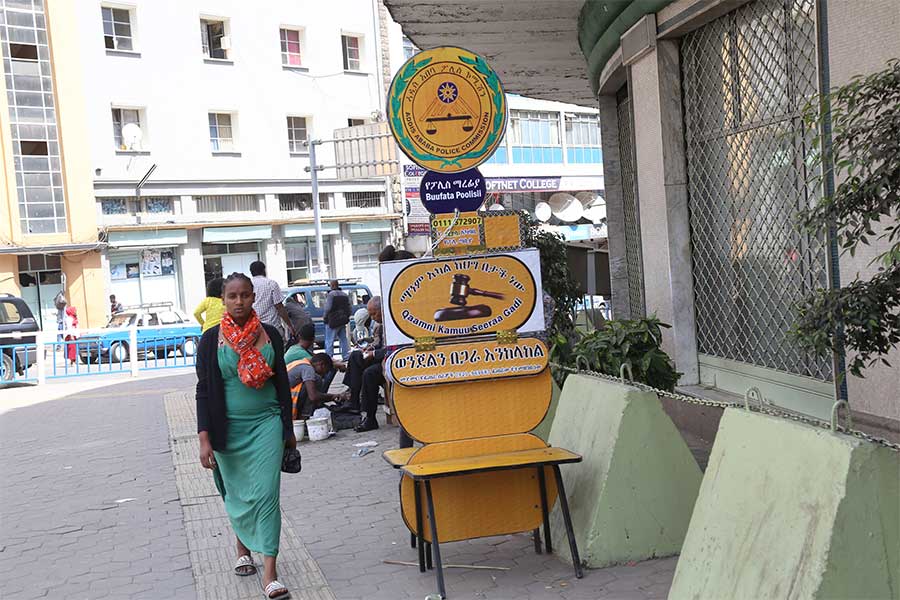
Agenda | Jul 31,2021
Jun 7 , 2020
A couple of weeks ago, leaders of the banking industry were complaining about increasing incidents of theft from the banks. Their recommendations? Imposing caps on how much cash depositors could withdraw at a time and limiting the amount that can be withdrawn within a month.
There appears to be a new operational model in motion for the regulators and industry leaders in the financial sector, gossip observed. Unlike in the past where policymakers came up with regulations and directives to enforce the shock doctrine model, the guys in charge now are trying to be a little cunning, a sort of apt by half move, as those in the gossip corridors see it.
Here is how it appears to be unfolding. Regulators at the central bank may want to introduce something to the financial market. But they call the presidents and CEOs of the banks and insurance firms for a talk, claims gossip. What follows is the industry leaders make public pronouncements urging the authorities to do certain things they claim are essential. A series of directives are churned out by the central bank, trying to give the impression that they only respond to what the industry demands of them, observed gossip.
A couple of weeks ago, leaders of the banking industry were complaining about increasing incidents of theft from the banks. Their recommendations? Imposing caps on how much cash depositors could withdraw at a time and limiting the amount that can be withdrawn within a month.
Yinager Dessie (PhD), governor of the National Bank of Ethiopia (NBE), appears to be too pleased to listen to what the industry tells him and act upon it. The central bank conveniently introduced caps and limits of withdrawals on individual depositors and companies.
Some in the industry see this too unthoughtful act in an economy that relies so much on cash eventually affecting transactions on critical sectors such as the supply chain in the coffee export market. Farmers, collectors and exporters are in large part carrying boxes and sacks of cash to transact a commodity too crucial to the country's economy. Adjustments and twinkling of this directive are inevitable down the road, gossip foresees.
The latest claim from the banking industry leaders was about the unaccounted for cash in circulation arguably exceeding 100 billion Birr. They urged the authorities to change the feature of the notes in circulation hoping to force people with money on hand to deposit it into the banking system. At the same time, they figured this would push the unaccounted for notes out of the market, eventually.
There has always been an amount in the central bank books marked as money circulating outside of the banking system. The more notes are printed and injected into the economy, and the slower the process of disposing of old notes no longer fit to circulate, this amount increases.
But it is interesting to see that the recommendation from the industry leaders urging the authorities to act was made after the central bank has already placed orders to its traditional printers to print banknotes in large quantities, gossip claims. It may appear that the authorities at the central bank are responding to recommendations from the industry, says gossip. However, the redesigned features of Birr notes with denominations of 10, 50, and 100 were made a long time ago, and they are due to appear in circulation perhaps after September 2020, gossip revealed. Indeed, the five Birr denomination is also in print but without changed features, claims gossip.
The French Charles Oberthur Fiduciare and the UK De La Rue Plc are often hired to do the printing jobs for Ethiopia, which costs the central bank tens of millions of dollars. It was in March last year that the central bank had ordered the printing of 187 million Br in 100 Br notes and 19.6 million Br in 50 Br notes. Their circulation in the economy was made in recent months.
Industry leaders have also urged the authorities to consider the introduction of banknotes in a higher denomination. It would be a little surprising to understand that one of the European printers have already taken orders to print banknotes with 200 Br denominations, gossip revealed. The Ethiopian public will get to know a new note for the first time in many decades just in a few months, gossip claims.
PUBLISHED ON
Jun 07,2020 [ VOL
21 , NO
1050]

Agenda | Jul 31,2021

Radar | Feb 29,2020

Fortune News | Apr 03,2021

Fortune News | Dec 13,2021

Radar | Jul 11,2021

Radar | Jun 26,2021

Agenda | Oct 23,2021

Viewpoints | Oct 30,2021

Fortune News | Aug 07,2021

Fineline | Sep 19,2020

My Opinion | 131766 Views | Aug 14,2021

My Opinion | 128149 Views | Aug 21,2021

My Opinion | 126095 Views | Sep 10,2021

My Opinion | 123717 Views | Aug 07,2021

Dec 22 , 2024 . By TIZITA SHEWAFERAW
Charged with transforming colossal state-owned enterprises into modern and competitiv...

Aug 18 , 2024 . By AKSAH ITALO
Although predictable Yonas Zerihun's job in the ride-hailing service is not immune to...

Jul 28 , 2024 . By TIZITA SHEWAFERAW
Unhabitual, perhaps too many, Samuel Gebreyohannes, 38, used to occasionally enjoy a couple of beers at breakfast. However, he recently swit...

Jul 13 , 2024 . By AKSAH ITALO
Investors who rely on tractors, trucks, and field vehicles for commuting, transporting commodities, and f...

Jul 5 , 2025
Six years ago, Ethiopia was the darling of international liberal commentators. A year...

Jun 28 , 2025
Meseret Damtie, the assertive auditor general, has never been shy about naming names...

Jun 21 , 2025
A well-worn adage says, “Budget is not destiny, but it is direction.” Examining t...

Jun 14 , 2025
Yet again, the Horn of Africa is bracing for trouble. A region already frayed by wars...

Jul 6 , 2025 . By BEZAWIT HULUAGER
The federal legislature gave Prime Minister Abiy Ahmed (PhD) what he wanted: a 1.9 tr...

Jul 6 , 2025 . By YITBAREK GETACHEW
In a city rising skyward at breakneck speed, a reckoning has arrived. Authorities in...

Jul 6 , 2025 . By NAHOM AYELE
A landmark directive from the Ministry of Finance signals a paradigm shift in the cou...

Jul 6 , 2025 . By NAHOM AYELE
Awash Bank has announced plans to establish a dedicated investment banking subsidiary...